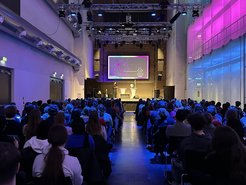Science meets entertainment: Frankfurt has brains - live!
On April 24, 2024, the event "Frankfurt hat Hirn - live!" (Frankfurt has brains), organized by the Hertie Foundation together with Frankfurt's neuroscientific institutions, captivated a packed house at the St. Peter Jugendkulturkirche in Frankfurt with an evening of engaging ‘flash talks’ and activities focused on the intricacies of the human brain. With a predominantly high school audience, the event provided a unique opportunity for young minds to delve into the fascinating world of neuroscience.

HR3 radio presenter Johannes Sassenroth hosted the evening, and in his introduction he noted the scientists' great ability to present their own sophisticated research in an understandable way in five minutes. It was a challenge that all the presenters met with ease and obvious pleasure.
The young audience was treated to a wide range of insights, from the influence of circadian rhythms on brain activity, as elucidated by Christian Kell of Goethe University, to the phenomenon of categorical thinking, explored by FIAS postdoc Jens-Bastian Eppler. Interspersed with thought-provoking and highly entertaining films from the Hertie Foundation, the event also featured captivating performances by mentalist Harry Keaton. Daniela Sammler from the Max Planck Institute for Empirical Aesthetics fascinated the audience with the human inclination for music, highlighted by findings such as the existence of 69 known rhythm-related genes. Meanwhile, Matthias Grabenhorst of the Ernst Strüngmann Institute demonstrated on the electric guitar how the brain learns and adapts motor skills early on through probabilistic predictions.
Marcel Jüngling, a PhD student in the Schuman lab at the Max Planck Institute for Brain Research, left a lasting impression on the audience with his discussion about the 86 million neurons responsible for preserving our thoughts and memories. He drew an intriguing analogy between the process of RNA conversion into protein, essential for these cognitive functions, and the operational dynamics of the food delivery companies "Hello Fresh" (local and targeted) versus Lieferando (global and standardized).
Throughout the evening, attendees had the opportunity to engage in hands-on experiments and discussions at information booths set up by the participating institutes, creating a holistic experience that celebrated the wonders of neuroscience and inspired the next generation of brain enthusiasts.







